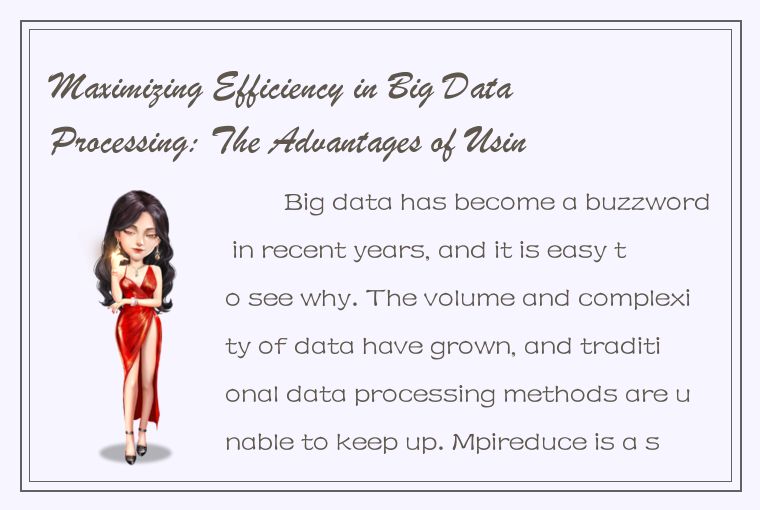Big data has become a buzzword in recent years, and it is easy to see why. The volume and complexity of data have grown, and traditional data processing methods are unable to keep up. Mpireduce is a solution that can help maximize efficiency in big data processing. In this article, we will discuss the advantages of using Mpireduce.

What is Mpireduce?
Mpireduce is a distributed computing framework designed to process large data sets efficiently. It is an open-source software platform that enables parallel processing of data across multiple computing nodes. Mpireduce is based on the MapReduce programming model, which was first introduced by Google.
The MapReduce model divides data processing tasks into two stages: map and reduce. In the map stage, data is split into smaller chunks and processed in parallel across multiple nodes. In the reduce stage, the results of the map stage are combined to produce a final output. Mpireduce automates this process and provides a streamlined interface for users to interact with the framework.
Advantages of Using Mpireduce
1. Scalability
Mpireduce is designed to be highly scalable, which means it can handle large data sets without sacrificing performance. Its distributed nature allows data processing tasks to be divided into smaller chunks and processed simultaneously across multiple nodes. This improves performance and reduces processing time, even as the size of data sets grows.
2. Fault Tolerance
Mpireduce is highly fault-tolerant. The framework is designed to automatically detect and recover from node failures. In the event of a failure, the affected node is replaced, and the data processing task is re-executed. This ensures that data processing is resilient and reliable.
3. Cost-Effective
Mpireduce is a cost-effective solution for big data processing. It is based on open-source software, which means that users can download and use it for free. Additionally, it allows users to use commodity hardware, which is less expensive than specialized hardware that traditional data processing methods require.
4. Faster Processing
Mpireduce enables parallel processing of data, which leads to faster processing times. Data processing tasks can be divided into smaller chunks and distributed across multiple nodes, which allows for processing to be done in parallel. Consequently, this reduces processing time and enables faster delivery of results.
5. Easy to Use
Mpireduce is user-friendly, and users do not need extensive programming knowledge to use the framework. It is designed to be intuitive, and the framework provides a streamlined interface for users to interact with. This makes it easy for users to process large data sets without extensive training or programming experience.
6. Flexibility
Mpireduce is a flexible solution for big data processing. It supports multiple data formats, including structured and unstructured data. Additionally, it supports multiple programming languages, including Java, Python, and C++. This makes it easy for developers and data analysts to use the framework with their preferred programming languages.
Conclusion
In conclusion, Mpireduce is a powerful solution for big data processing. Its scalability, fault tolerance, cost-effectiveness, faster processing, easy-to-use interface, and flexibility make it an ideal choice for organizations looking to optimize their big data processing workflows. Mpireduce provides a streamlined interface for users to interact with and is based on open-source software, which means that it can be used without additional licensing costs. With Mpireduce, organizations can process large data sets more efficiently and unlock valuable insights from their data.




 QQ客服专员
QQ客服专员 电话客服专员
电话客服专员